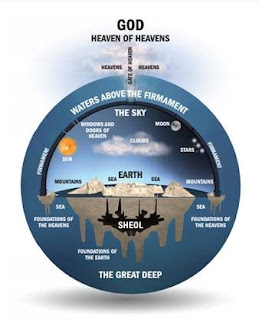 Ascension Day is one of those days on the church calendar that most of us don't know what to do with. We know that the Apostle's Creed says:
Ascension Day is one of those days on the church calendar that most of us don't know what to do with. We know that the Apostle's Creed says:He ascended into Heaven, and sits at the right hand of God, the Father almighty;But we sometimes get some odd views of what it means for Jesus to ascend. Part of that is because we try to read 21st century science back into the 1st century. The author of Acts (Luke) had no notion of light years, of outer space, of the things that are part of our understanding of the cosmos. As someone has put it:
The ascension is harder to believe in than the resurrection.Keith Ward, in his book, The Big Questions in Science and Religion:
We now know that, if [Jesus] began ascending two thousand years ago, he would not yet have left the Milky Way (unless he attained warp speed).James D. G. Dunn’s article on “Myth” in Dictionary of Jesus and the Gospels:
To demythologize the ascension is not to deny that Jesus “went to heaven”; it is simply to find a way of expressing this in language which takes it out of the realm of current or future space research.
 The new NIV Faithline Study Bible has an graphic of the ancient Hebrew worldview of cosmology. I think we sometimes try too hard to make the ancient Hebrews (and therefore the Old Testament) to literal. I wonder, if maybe they were better at metaphor than we sometimes are.
The new NIV Faithline Study Bible has an graphic of the ancient Hebrew worldview of cosmology. I think we sometimes try too hard to make the ancient Hebrews (and therefore the Old Testament) to literal. I wonder, if maybe they were better at metaphor than we sometimes are.Ascension day is a perfect day to remind ourselves that literalism is not only problematic, but impossible. Even if someone insists on maintaining the literal truth of the claim in Acts that Jesus literally went up into heaven, they cannot maintain the worldview of the 1st century Christians which provided the context for the affirmation. Those early believers knew nothing of light-years, distant galaxies or interstellar space without oxygen. And it is not possible, either through some act of will or by faith, to ignore or forget everything that has been learned since then and believe as they did.
There are many people who claim that they are Biblical literalists. But there are no actual Biblical literalists. Because even the precise words of the Bible, taken literally, mean something different today than they did almost 2,000 years ago.
Dallas Willard, in The Divine Conspiracy, writes:
The damage done to our practical faith in Christ and in his government-at-hand by confusing heaven with a place in distant or outer space, or even beyond space, is incalculable. Of course God is there too. But instead of heaven and God also being always present with us, as Jesus shows them to be, we invariably take them to be located far away and, most likely, at a much later time – not here and not now. And we should then be surprised to feel ourselves alone?Larry Norman, in U.F.O., sang,
And if there's life on other planetsThen I'm sure that He must knowAnd He's been there once alreadyAnd has died to save their souls
Comments